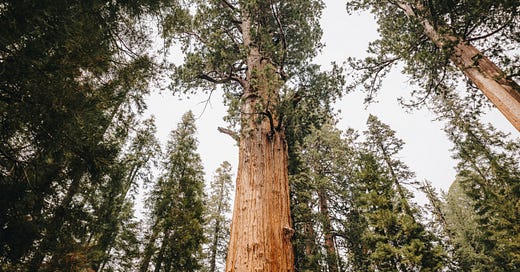I was the first in my family to leave the West Coast. I think I surprised just about everyone when at 22, I got a wild hair and followed it across the country with everything I owned stuffed in two suitcases.
Twelve years later my parents followed, leaving California for a more affordable retirement and closer proximity to their only daughter. My Grandma is still there in the sweltering sprawl of Los Angeles, spending most of her days within the four walls of her apartment.
The thought of her being alone pinches.
We had hoped she’d come around and join my parents when they made the cross-country move. Instead, I watch her cling to California like late autumn fruit on a vine. Tightening her grip long after all the others have fallen away, gritting her teeth against the frost. "I can't stand the cold."
• • •
Nearly four million visitors flock to Yosemite National Park each year to feel its pulse—the same one that has captivated artists, conservationists, inhabitants, and sightseers for generations. I can't speak for them, but I know the dam that breaks in me when I set foot in the Sierra. A silent rupture.
Yosemite's is a pristine and feral splendor that's been sculpted over time. Millions of years ago geological uplift began steepening the Sierra Nevada; later, glaciers tongued their way down through river canyons to form Yosemite Valley and its endless list of stunning features.
On the western slope of the High Sierra near the park’s south entrance stands a thicket of giant sequoias known as Mariposa Grove. Follow the winding path from the trailhead through the woods and you'll find the Grizzly Giant, a towering 209-foot being that once shared the earth with Socrates and Cleopatra and still stands, teeming with ancient power.
• • •
Growing up, she was my active Grandma. The wheat-bread-eating, always-out-doing-something foil to my crafty, indoorsy grandma (who I also adored). Sturdy but chic in her signature uniform of crisp white button downs and smart flats with pops of purple, her color. I'd heard stories from her Sierra Club excursions and trips to Paris, the time she flew to DC to protest the war, afternoons spent seeing independent films and taking herself out for tea.
Whenever I stayed with her for the weekend we'd walk to Noah's Bagels where we sat in the front window, my feet dangling from the counter stool. My order never wavered: an egg bagel, toasted with butter, and Martinelli's apple juice in a small glass jar. I knew what I liked, and she never pressed me to stray. I wonder if even back then, before her hair had silvered and her world began to shrink, she saw a piece of herself in those familiar buttered crumbs.
These days there are 2,700 miles and three time zones between us. Deep sighs stretch out like deserts on the phone, in between gentle questions about my life and stories about her cat. My parents and I wring our hands behind the scenes, waiting for the day she’s ready to accept help and leave the devil she knows to be near family.
But honestly, my exasperation is convenient armor. The sharper truth is that it all feels like foreshadowing. That every time creature comforts keep me tethered to what I know, I see familiar fruit: an anxious homebody apple, fallen at the foot of her shaken tree.

Lately I notice too much time alone turns me porcelain. A far cry from a younger version of me who seized alone time as a sea of opportunities: to make brunch plans, to roast herself salmon for dinner, to stretch her legs toward the other side of the bed and find the cool patches of sheets.
Now, on nights when I’m alone while my husband travels for work I seem to lose all sense of rhythm, sinking into the sofa like a bag of sand with a plate of leftovers in my lap while one episode of This is Us rolls into the next, into the next. The room is tinged with a shade of homesickness I haven’t felt since sleepaway camp the summer before second grade. Awake and adrift in the infinite dark, a moon with no planet.
What can I blame for this sudden fragility?
It’s hard to say age or genetics are the culprit, when my great-uncle is such an obvious rebuttal: a man who, at 94, still gleams. Who went on photography trips around the country with my dad well into his 80s, whose 90th birthday party brimmed with people who whispered to each other between toasts, “I want to be like Jack when I grow up.” Seemingly the inspiration behind my dad’s latest mantra for aging well: purpose and community.
It’s a solid blueprint, no doubt. Then again it feels unfair to put someone like Jack on a pedestal beside my Grandma, and maybe myself. The good extroverts vs. the homebodies. As if it's a sin to savor a quiet life.
• • •
In 1964 Congress passed the Wilderness Act for the ongoing conservation of America's wildest places, which would later help establish and protect Yosemite Wilderness.
The bill succeeded thanks in large part to the Sierra Club and its most ardent supporters—among them, Ansel Adams. As a conservationist and an artist who spent his career paying homage to the American West, Adams understood the importance of protecting wild spaces from the human thirst for convenience.
"I am an artist who also appreciated science and engineering, and I know we can’t keep everything in a glass case—with the keys given only to a privileged few. Nevertheless, I want people to experience the magic of wildness; there is no use fooling ourselves that nature with a slick highway running through it is any longer wild."
— Ansel Adams
I grapple with my own thirst for comfort, and how to square that with my desire to conserve whatever wildness is in me as I age.
The USDA defines conservation as the careful maintenance and upkeep of a natural resource to prevent it from disappearing. What wild parts of me threaten to disappear if I keep reaching instinctively for what’s soft and familiar?
The Wilderness Act places special emphasis on preserving wilderness by bowing to natural forces. That means, among other things, allowing lightning fires to burn with minimal interference—knowing that the human eye will mistake a necessary fire with something that needs saving. Over time, mature sequoias have adapted to survive these fires, their flame-resistant bark safeguarding them from being turned to ash by some future blaze.
What policies must I adopt in my own life, so I might age like a sequoia in a grove? Sturdy and weathered, unafraid of small burns, forever stretching up, up, up?
• • •
It’s late summer and we’re on the back deck with my parents, soaked in grill smoke and sipping cold beers. We are deep in conversation about travel when my dad’s blue eyes brighten, the way they do when he’s about to say something wise.
"You know, I’ve learned if you want to experience something great, you've gotta be willing to suffer a little.” If you want the great view, you’ll probably have to power through a tough uphill climb. Things worth having rarely come easy.
My husband checks the burgers while my mom and I step inside to prepare toppings. We stand at the kitchen island slicing tomatoes and she asks if my Grandma ever told me about the time she hiked the White Mountains. “At first she hated it. She hadn't done it before, she was tired and her feet hurt." But then, something changed. “After a few days she started to really enjoy it. And she was so proud of herself for having done it.”
I picture my Grandma up on a mountain ridge in New Hampshire looking out over a canopy of trees. High on triumph after winning her wrestling match with discomfort. Lungs pumping with mountain air.
I wonder if this is why we’re drawn to the wild—to tangle with ourselves. To try and glean something from the sugar pines and granite canyons about resilience, and what wild jewels might be unearthed when we’re willing to be forged by the elements.
Over dinner, I tell my parents about the retreat in Wyoming I just booked on a whim for next spring. Very unlike me. There will be horseback riding through canyons and lunch picnics in meadows, afternoon writing workshops and evening campfires with friends-in-waiting. I’ll sleep in a tent next to Paintrock creek, just a speck under the stars in Big Sky country.
"I have no idea how I'll get there, or if there's plumbing, or if my knees can handle a week of riding a horse," I tell them. "I just know I have to go."
The Webs We Weave is a free weekly-ish newsletter on staying connected to ourselves, making connections in our creative work, and feeling more connected in the world. Thank you for being here.











This is literary and emotional genius, Michelle 😮 💜🤗
What a propulsive piece over generations and state lines! A joy to read. I was very moved by that giant around in the time of Socrates and Cleopatra. Sequoias' fireproof bark. The permission to let ourselves be "forged by the elements."